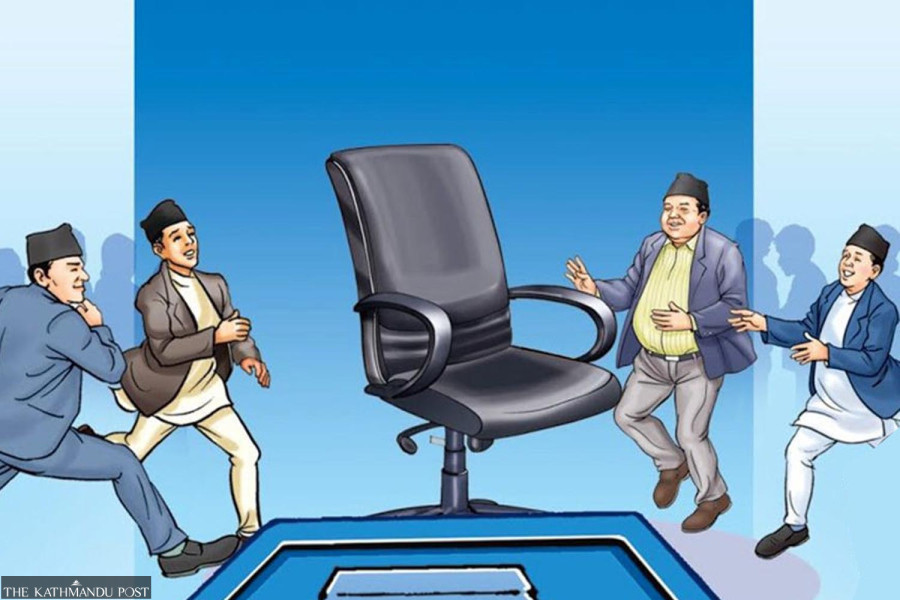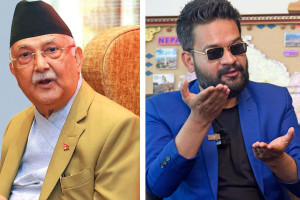Columns
State of urgency
Years of mis-governance and incompetence of the current political elite have led to pervasive distrust in Nepal.
Ajay Das
There is a global trend of declining trust in government, and Nepal is no exception. The UN's recent World Social Report 2025 reveals that globally over 57 percent of people express low trust in their governments. This percentage is higher among Gen Z. In Nepal, the disillusionment with political parties that are routinely failing to deliver on their promises, coupled with the influence of social media on public opinion, has fueled widespread frustration and disengagement, particularly among the youth. In Nepal, this cynicism is a chronic issue that has intensified due to decades of broken pledges, coalition manoeuvring, policy paralysis, malpractices and mis-governance.
In the past decades, the same old political parties and their leaders have been clinging to power, continuously circling the control of Singha Durbar among themselves. Instead of focusing on governance and service delivery, the governments have been preoccupied with saving coalitions. Civil servants, on the other hand, are often occupied with maintaining ties with political parties. Political parties protect corrupt government officials. The politicised bureaucracy is more loyal and accountable to party interests than public service delivery.
Political leaders at the helm of power speak of grand reforms but fail to address the everyday concerns of ordinary citizens. Policies formulated in Kathmandu often fail to reflect the realities on the ground. The disconnect further alienates the public, eroding trust in hard-earned federalism, republicanism, secularism and proportional representation. The disconnect and discontent are pushing citizens onto the streets in protest. The public frustration is at an all-time high.
When it comes to curbing and eradicating rampant corruption, the focus is on high-profile cases like the fake Bhutanese refugee scam, cooperative frauds and the recent visit visa scam. Political leaders rally public support with promises of “catching big fish” to influence public opinion, while the “small fish” have already hollowed our institutions. Our democracy is not shaped by the values of social justice, rather by broker-led governance, where middlemen and brokers thrive and state institutions falter.
The deep-rooted corruption has created a public perception that the current governance system is inherently flawed. This sentiment is not without basis. While a handful of individual leaders, whether in political parties, bureaucracy or the judiciary, are responsible for malpractice and mis-governance, the general perception is shaped to suggest that the defect is in the current federal system of governance.
Although the current broker-led governance—a product of decades of mismanagement and abuse of power by political elites—has weakened our democratic institutions, it’s not irreparable. Those responsible for this decline are now tasked with rebuilding public trust. People have again entrusted them in power, expecting them to spearhead change, not merely maintain the status quo. As long as the elected political parties continue to benefit from the legality and legitimacy of being elected, they must act responsibly.
Democratic roots in Nepal are fragile, and social and political polarisation is intensifying. Public frustration and disenchantment are on the rise. The current coalition government was formed with the promise of amending the constitution, a crucial opportunity to inject new life into the beleaguered political system. Since the 2022 elections, political rhetoric has overtaken real reforms. If leaders ignore the voice of the people, they risk losing legitimacy altogether, paving the way for social unrest. Now is the time to declare a state of urgency and amend the rules of the game.
An amendment to the constitution creates different opportunities, including for electoral reform. The rising expenses of election campaigns have become a breeding ground for corruption and have skewed democracy. Political parties and their candidates heavily rely on “tycoons and wealthy donors” as financial demands increase. This trend dents electoral transparency. Introducing state funding for political parties based on a threshold of popular votes could help level the playing field and curb financial manoeuvring in politics. However, robust policies will be needed to hold the political parties accountable.
As the saying goes, transparency should begin at home. Political parties must lead by example by ensuring internal democracy and financial transparency. The absence of financial accountability has eroded public trust at every level, causing citizens to become increasingly disillusioned.
There are simply too many elected representatives; the assemblies are like a space that offers jobs to party cadres. The provincial assemblies should be rightsized, and cost-cutting measures should be implemented across federal and provincial ministries. By reducing unnecessary expenditures, the government can show accountability for taxpayers’ money, reinforcing public trust in the state’s financial system.
The rot isn’t limited to the executive. Currently, 28 bills, including the School Education Bill and the Federal Civic Service Bill, have remained pending for years. Lawmakers’ inability to reach a consensus raises serious questions about their competence. This legislative paralysis has pushed not just republicans and monarchists, but also Madhesh-based parties, teachers, civil servants, journalists, businesspeople, victims of cooperative frauds and loan sharks into the streets.
Recent protests by public school teachers were resolved only superficially. Many teachers remain dissatisfied, doubting the government’s commitment to real reform. The 2018 High-Level National Education Commission’s recommendations have been ignored. The government cannot afford to come up with patchwork solutions; it must prioritise genuine dialogue and consensus-building with the disgruntled groups.
The judiciary is not immune either. There is a backlog of nearly 200,000 cases pending due to a shortage of judges and inaction by the Judicial Council. Appointing judges at all levels is as urgent as appointing a new vice chancellor at Tribhuvan University, where political interference recently forced the resignation of a reformist Vice Chancellor.
Years of mis-governance and incompetence of the current political elite have led to pervasive distrust. Public faith in federalism, republicanism, and democracy itself is fast eroding. The longer the political establishment fails to act, the more fertile the ground becomes for instability.
Nepal is at a tipping point. A fragile democracy cannot afford to be paralysed by feckless leadership. There is an urgent need to initiate reform before public disillusionment turns to civil unrest and the country’s democratic gains are lost. With the right leadership, commitment and inclusive engagement, the country can still steer away from crisis and move toward a more equitable, responsive and accountable political system. The time to act with urgency and integrity is now, not after the 2027 election, and not under the “Mission Chaurasi” (Mission 2084) slogan.




 10.12°C Kathmandu
10.12°C Kathmandu















